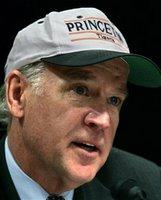David Broder
writes wistfully of a day "when partisan venom didn't rule."
Please. Give me a break. His big example? After Ronald Reagan was almost assassinated, Tip O'Neill visited him in the hospital, kissed him and prayed by his bed.
A lovely thing to do, I submit, but -- after all -- the President was nearly killed. Is it really a mark of a bipartisan utopia that a leader from the opposite party would be upset? One hopes not. And the fact that Democratic leaders wouldn't do the same for President Bush doesn't mean that the past was perfect: It means that the Democrats today have been driven over the brink by partisan political hatred. (Notice you don't hear President Bush condemning the Democrats from the lectern the way that President Clinton used to excoriate the Republicans).
In any case, unusual events lead to unusual displays. After all, at one point, Tom Daschle and President Bush embraced (OK, yes, it took 9/11 . . . but still). Umprecedented or devastating events can yield amazing displays of (temporary) comity.
But it doesn't mean that there was no partisan venom in the Capitol in the 1980's. The supposedly benevolent O'Neill
also remarked openly of President Reagan that ""He knows less than any president I've every known" and
opined that he was "Herbert Hoover with a smile." Of course, it's not in the same league as Teddy Kennedy ranting that the Iraq war was a
"fraud" cooked up in Texas, but still. Not so nice.
Old-timers like Broder always wax nostalgic about the "good old days" of bipartisan harmony -- all of which seem to date from before 1994. Before 1994, the Republicans in the House were led by the amiable Bob Michel, and they knew their place, by darn. They weren't
dominant for heaven's sake, and while they controlled the presidency, the Democrats were the barons of Capitol Hill.
If David Broder thinks that the '80's were a decade without political venom, he might want to check with
Ray Donovan ("Where do I go to get my reputation back?") and Bob Bork.

 January 20, 1981:
January 20, 1981: